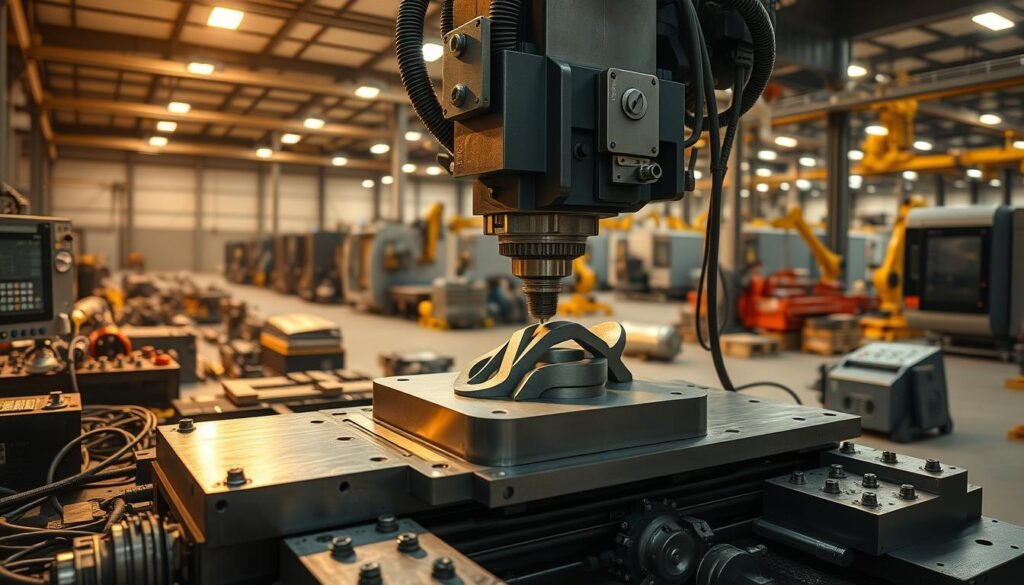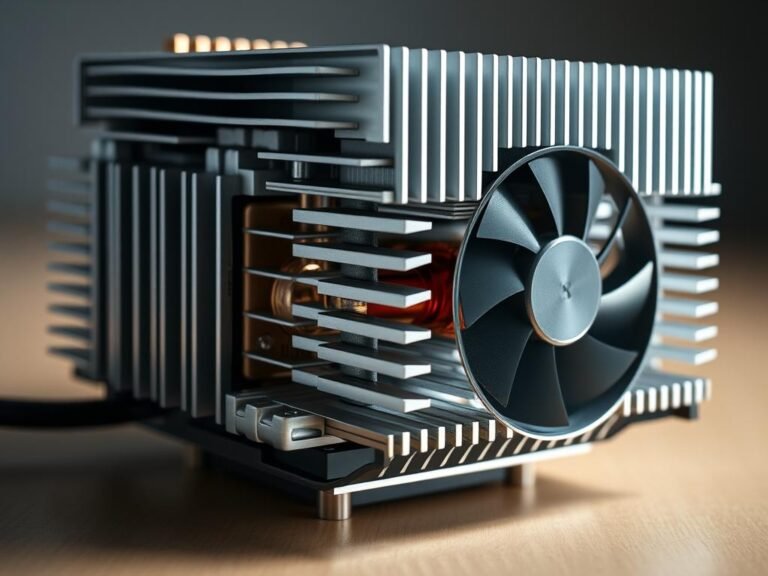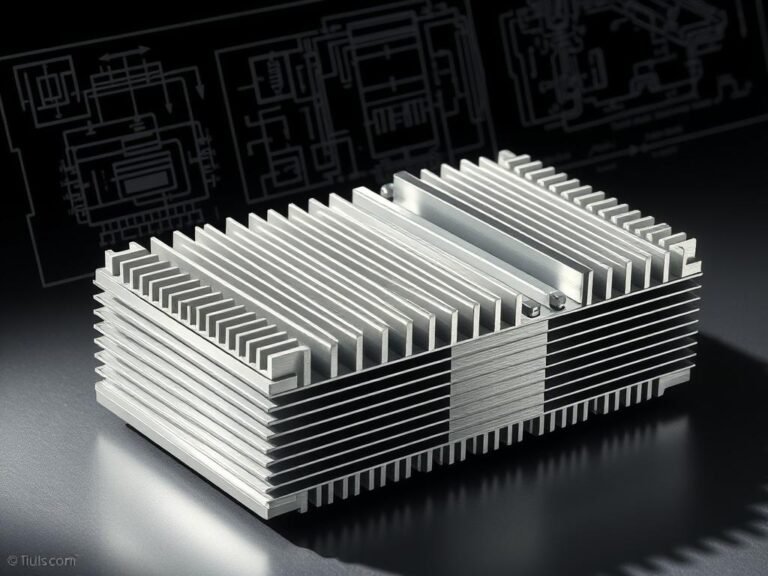CNC machining is a revolutionary manufacturing process that has fundamentally changed modern production technology. In this computer-controlled manufacturing, machines are precisely controlled by computer programs to produce highly complex workpieces with exceptional accuracy.
The CNC technology enables companies to have unprecedented control over manufacturing processes. Through digital control systems, metalworking machines can cut, mill, and shape workpieces with millimeter precision.
Industrial applications of CNC machining range from the automotive industry to medical technology. Precision, repeatability, and efficiency are the key features of this advanced manufacturing method.
Definition of CNC machining
The computer-controlled numerical control (CNC) is revolutionizing the modern manufacturing industry through precise and automated production processes. CNC machines are advanced machine tools that perform complex machining tasks with exceptional accuracy.
The core features of CNC machining include:
- Digital control of manufacturing processes
- High-precision processing of various materials
- Minimization of human error sources
- Repeatable manufacturing steps
Unlike traditional manufacturing methods, automated manufacturing with CNC machines enables significantly more efficient and controlled production. The technology uses complex software programs to precisely control and position tools.
"CNC technology transforms industrial production through precision and efficiency."
The abbreviation CNC stands for Computer Numerical Control and describes a process in which computer-controlled systems automatically operate machine tools. This technology enables reproducible manufacturing with minimal tolerances.
Subtractive manufacturing process in CNC machining
The subtractive manufacturing process forms the core of CNC machining. In this process, material is precisely removed from a blank to create the desired shape. Unlike the additive process, where material is added, material removal focuses on the targeted removal of workpiece parts.
The main methods of subtractive manufacturing include:
- Milling: Machining metal surfaces with rotating tools
- Rotate: Processing of rotationally symmetric workpieces
- Drilling: Creating precise holes in various materials
Each of these techniques enables highly precise material removal. The CNC control guarantees exceptional accuracy and repeatabilityComplex geometric shapes can be manufactured with minimal deviation.
"Precision is not just a characteristic, but our working principle" – Industry Expert
The advantages of the subtractive manufacturing process lie in high flexibility and cost-effectiveness. Through computer-controlled processes, milling, turning, and drilling become an efficient manufacturing technology used in various industries.
Operation of Computer Numerical Control
The Computer Numerical Control (CNC) is an advanced manufacturing system that enables precise machine control through digital technologies. The core of this technology lies in converting digital design data into precise machine movements.
The production process begins with creating a 3D model in the CAD/CAM software. This digital design is then in G-Code translated, a special programming language that CNC machines understand.
- Create a digital 3D model
- Convert model in CAD/CAM software
- Generate G-Code
- Execute machine commands
The precision of the machine control enables extremely accurate processing. Each movement is executed by computer control, ensuring high repeatability.
| Component | Function |
|---|---|
| CAD-Software | Digital Construction |
| CAM-Software | Conversion into machine commands |
| G-Code | Precise control commands |
Modern CNC systems utilize advanced algorithms to optimize complex machining processes and increase productivity.
Advantages of CNC machining
CNC machining revolutionizes modern manufacturing processes through its outstanding performance features. Companies can significantly increase their efficiency and simultaneously reduce production costs through this technology. The quality improvement is a key advantage that makes manufacturing companies more competitive.
Precision technology enables high-quality production with minimal deviations. Industrial manufacturing facilities benefit from CNC machining through reproducible results and optimized workflows.
Kernel insights
- Significant increase in production efficiency
- Significant cost reduction in manufacturing
- Highest precision in manufacturing
- Minimization of human error rates
- Flexible adaptability in various industries
Precision
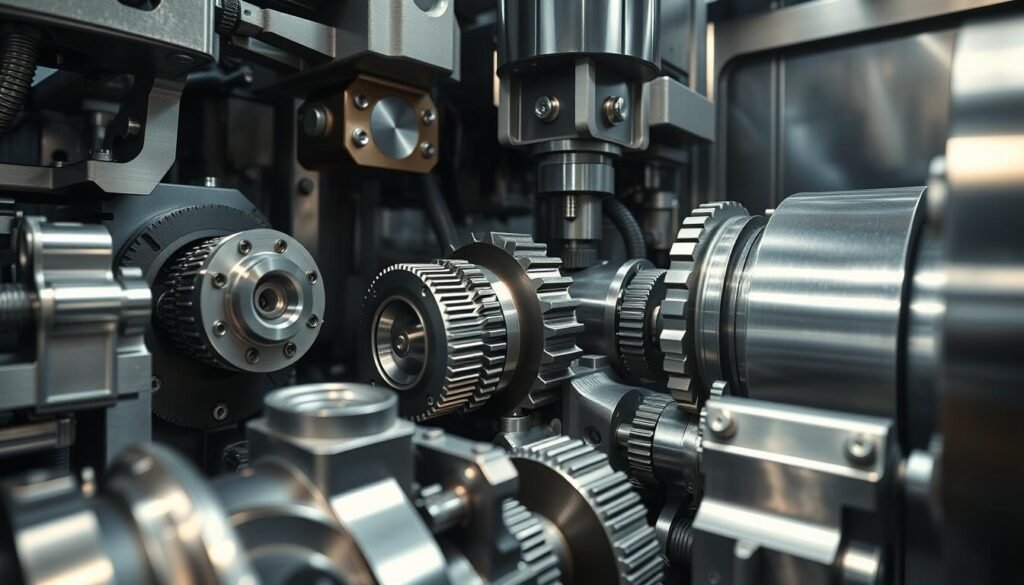
CNC machining revolutionizes modern manufacturing technology through its exceptional accuracy. Precision is the key to producing highly complex geometries with minimal tolerances. CNC machines achieve dimensional accuracy at the micrometer level, far surpassing traditional manufacturing methods.
The strength of CNC technology lies in its ability to produce complex geometries with the highest accuracy. Modern CNC systems can manufacture workpieces with precision tolerances of less than 0.01 mm – a feat that human manual work could not achieve.
- Micrometer-precise processing
- Constant repeat accuracy
- Minimal manufacturing tolerances
The advantages of precise CNC machining extend across various industries:
- Medical technology: Implants and surgical instruments
- Aerospace: High-precision component manufacturing
- Electronics: Microcomponents with extreme precision
Through advanced control technologies and highly precise tools, CNC machining enables a manufacturing quality that was previously unthinkable. The dimensional accuracy and reproducibility make it a key technology for demanding industrial applications.
Repeatability
The repeatability is a crucial aspect of CNC machining that ensures consistent quality in mass production. CNC machines are characterized by their exceptional ability to produce precise and nearly identical parts.
Core features of repeatability accuracy include:
- Minimal deviations between individual production cycles
- High-precision reproducibility of workpieces
- Constant quality assurance throughout the entire production phase
Reproducibility enables companies to manufacture complex components with the highest precision. Industrial applications especially benefit from this technological precision, since even minimal deviations can have significant impacts.
Technical advantages of repeat accuracy:
- Reduction of material waste
- Increase in productivity
- Guarantee of consistent product quality
CNC machines achieve a repeatability accuracy of up to 0.01 mm, making them precise tools in the modern manufacturing industry.
Flexibility
The adaptability of CNC machines is revolutionizing modern manufacturing technology. These highly advanced systems enable incredible product diversity through quick retooling and reprogramming.
Core features of CNC flexibility include:
- Quick program switching for different product types
- Minimal setup times between manufacturing tasks
- High adaptability to different workpieces
Small and medium-sized enterprises especially benefit from this technology. The ability to quickly switch between productions reduces downtime and increases overall efficiency.
| Production type | Conversion time | Flexibility level |
|---|---|---|
| Traditional manufacturing | 2-4 hours | Low |
| CNC machining | 15-30 minutes | Very high |
The technology enables companies to respond quickly to market changes and meet customer-specific requirements.
Automation
CNC machining revolutionizes modern manufacturing processes through advanced automation technologies. Companies can significantly increase their production efficiency through process optimization while simultaneously reducing personnel deployment.
Core features of automation include:
- Minimal human intervention
- Continuous 24/7 production
- Precise control of complex manufacturing steps
CNC machines enable nearly fully automatic production. They can perform precise workflows without constant manual supervision, leading to a significant increase in productivity.
| Automation aspect | Productivity gain |
|---|---|
| Reduced staffing | Up to 60% cost savings |
| 24/7-Produktion | Continuous manufacturing possible |
| Process optimization | Error reduction by 90% |
The implementation of automated CNC systems offers companies a decisive competitive advantage through increased efficiency and precision.
Reduction of errors
CNC machining revolutionizes modern manufacturing technology through its precise error reduction. Quality assurance is at the center of technological progress.
Process safety is achieved through several key mechanisms:
- Elimination of human error sources
- High-precision computer-controlled movement sequences
- Continuous monitoring of manufacturing parameters
The minimal waste is a major advantage of CNC technology. Modern systems achieve accuracy tolerances of less than 0.01 mm, which far surpasses traditional manual manufacturing methods.
| Error source | Manual | CNC machining |
|---|---|---|
| Precision | ±0.1 mm | ±0.01 mm |
| Repeatability | Low | Very high |
| Rejection rate | 5-10% | 0,5-1% |
The advantages of CNC technology in error reduction are impressive. Precision, consistency, and reliability are maximized through computer-controlled processes.
Applications of CNC machining
CNC machining has become a crucial technology in the modern manufacturing industry. Its versatile applications span numerous industries and revolutionize the way companies produce precision parts.
The technology enables manufacturing companies to achieve unprecedented flexibility and accuracy in the production of complex components. From the automotive industry to medical technology, CNC machining offers innovative solutions for high-precision manufacturing requirements.
Key findings
- CNC machining covers various industrial applications
- Highest precision in component manufacturing
- Versatile applications in various industries
- Optimization of manufacturing processes
- Technology drives industrial innovation forward
Automobile industry
CNC machining plays a crucial role in the modern automotive industry. Precision parts are the key to manufacturing high-quality vehicle components. Modern automakers are increasingly relying on this advanced manufacturing technology to produce complex engine parts and body components.
The advantages of CNC machining in automotive manufacturing are numerous:
- Highest precision in engine parts
- Consistent quality of body components
- Reduction of manufacturing defects
- Faster production cycles
Especially in critical areas such as engine manufacturing and bodywork production, CNC machining enables a extraordinary manufacturing precisionComplex components such as cylinder heads, crankshafts, and transmission parts are manufactured with millimeter precision.
The CNC technology is revolutionizing automobile manufacturing through its unmatched precision and efficiency.
Economically, CNC machining reduces production costs through minimal material waste and decreased manual intervention. Automakers can thus produce high-precision parts in less time and at lower costs.
Aerospace industry
The aerospace industry imposes extremely high demands on manufacturing technologies. CNC machining plays a crucial role in the production of high-precision lightweight components and critical structural parts.
Modern aircraft require components that achieve maximum performance with minimal weight load. For example, turbine blades must withstand the highest stresses while remaining lightweight.
- Manufacturing of precise lightweight components
- Processing complex structural components
- Manufacturing of high-stress turbine blades
The CNC technology enables unmatched precision in the manufacturing of aerospace-specific components. Through computer-controlled precision machining, even the most complex geometries can be produced with tolerances in the micrometer range.
| Component | Material | CNC-Bearbeitungsvorteile |
|---|---|---|
| turbine blades | Titanium alloys | Highest precision |
| Structural components | High-strength aluminum alloys | Weight optimization |
| Aerodynamic components | Composite materials | Complex shaping |
The investment in CNC machining technologies is essential for aerospace companies to remain competitive and meet the highest safety and performance standards.
Medical technology
CNC machining plays a crucial role in modern medical technology. High-precision manufacturing technologies enable the production of complex medical components with exceptional accuracy and reliability.
Core areas of CNC machining in medical technology include:
- Manufacturing of implants with the highest precision
- Development of surgical instruments
- Production of prosthetic components
With implants, CNC machining guarantees millimeter-precise manufacturing. Biocompatibility and surface quality are crucial for functionality and compatibility within the human body.
Surgical instruments require absolute precision. CNC machines can produce complex geometric shapes with tolerances in the micrometer range. This ensures maximum safety and performance during medical procedures.
Prosthetics also benefit greatly from CNC machining. Custom-made prostheses are produced quickly and precisely, significantly improving patients' quality of life.
Electronics industry
The electronics industry uses CNC machining as a key manufacturing technology for high-precision components. Especially in the production of enclosures, heat sinks, and circuit boards, this technology plays a central role.
Modern electronic devices always require smaller and more complex components. CNC machining enables the production of microscopically precise structures that traditional manufacturing methods cannot achieve.
- Precise processing of enclosures for electronic components
- Optimization of heat sinks for efficient heat dissipation
- Highly detailed manufacturing techniques for circuit boards
The advantages of CNC machining in the electronics industry are diverse:
| Aspect | Meaning |
|---|---|
| Miniaturization | Enables extremely small component sizes |
| Precision | Tolerances in the micrometer range |
| Repeatability | Constant quality in mass production |
Especially heat sinks benefit from CNC machining, as complex cooling structures can be manufactured with the highest precision.
The technology helps electronics companies develop innovative and high-performance products. From smartphone components to medical devices, CNC machining enables a new level of manufacturing precision.
Mechanical engineering
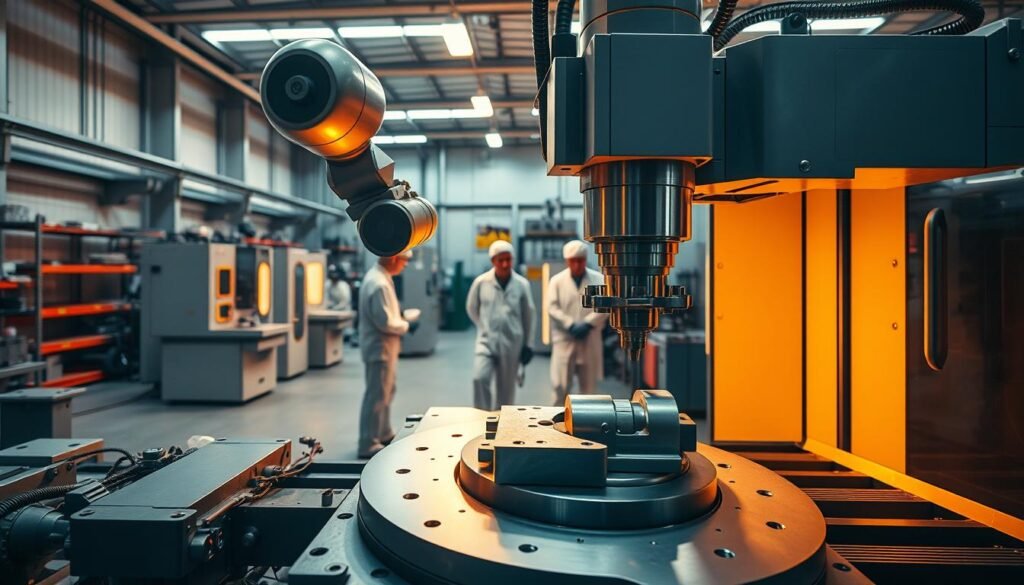
Mechanical engineering sets the highest standards for precision and quality. CNC machining plays a central role in tool manufacturing and the production of complex machine parts. Modern manufacturing technologies enable the production of highly precise custom-made parts with exceptional accuracy.
Core areas of CNC machining in mechanical engineering include:
- Precise tool manufacturing
- Complex machine parts
- Custom special orders
The technology allows the production of components with micrometer-precise tolerances. Modern CNC machines can process materials such as steel, aluminum, and special alloys with the highest precision.
| Processing type | Scope of application | Precision |
|---|---|---|
| Milling | Machine frame | ±0.01 mm |
| Rotate | Waves and rotation parts | ±0.005 mm |
| Drilling | Connecting elements | ±0.02 mm |
The flexibility of CNC machining allows engineers to develop complex geometric shapes and highly precise components for a wide range of applications in mechanical engineering.
Plastic industry
The plastic processing has made a significant technological leap in recent years. CNC machining plays a central role in modern mold making and prototyping of plastic parts. The precise manufacturing technology enables companies to produce complex plastic components with the highest accuracy.
Important application areas of CNC machining in the plastics industry include:
- Precise prototyping of plastic parts
- Manufacturing of complex mold tools
- Mass production of plastic components
- Development of technical plastic parts
The process of plastic processing using CNC technology offers significant advantages:
- Extremely high precision
- Reproducible results
- Minimal material waste
- Fast product development cycles
In industrial manufacturing, CNC machining is increasingly used as a key technology for innovative plastic solutions. The flexibility of the technology allows processing of various plastic materials with different mechanical properties.
| Plastic type | CNC-Bearbeitbarkeit | Typical applications |
|---|---|---|
| ABS | Very good | Electronic enclosure, automotive |
| Polycarbonate | Excellent | Medical technology, optics |
| PEEK | Challenging | Hochtemperatur-Anwendungen |
The mold making benefits especially from CNC machining, as complex geometries and high-precision surfaces can be efficiently realized. Modern CNC machines enable unprecedented precision in plastic processing.
Summary of CNC machining
CNC machining has established itself as a key technology in modern manufacturing. It represents a significant step into the future of manufacturing by enabling precise and efficient production processes. companies use this technology to produce complex components with the highest accuracy.
In the context of Industry 4.0, CNC machining plays a central role in the digital transformation of industrial manufacturing processes. The integration of computer-controlled systems allows for unprecedented control and optimization of manufacturing procedures. Modern manufacturing companies are increasingly relying on these advanced technologies.
The development of CNC machining demonstrates the enormous potential for technological innovation. Automated processes, improved software solutions, and intelligent machine systems will further revolutionize the manufacturing industry. Companies that invest early in these technologies secure a decisive competitive advantage.
In conclusion, it can be said that CNC machining is much more than just a manufacturing technique. It represents a holistic approach to production optimization that combines precision, efficiency, and innovation. The future of manufacturing will be significantly shaped by this technology.
